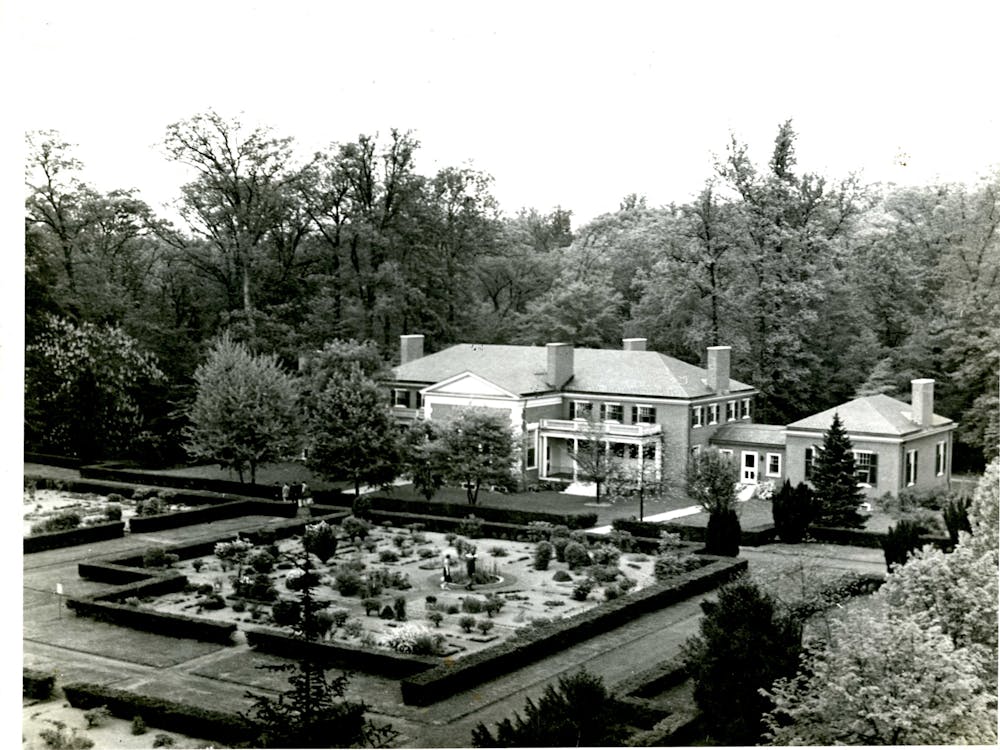Reverend Daryl Kearney discussed the intersections of race, faith and politics at the Bunting-Meyerhoff Interfaith and Community Service Center on Wednesday. The talk was the first part in a speaker series hosted by the JHU Social Justice and Equity Collective.
Lester Spence, the co-director for the Center for Africana Studies and associate professor of political science, moderated the discussion.
Kearney, who serves as the pastor of Turner Memorial African Methodist Episcopal Church in Hyattsville, Maryland, stressed the importance of tackling the roots of social justice issues in America today.
“We often go after the fruit that’s hanging from America’s tree: racism, sexism, classism, homophobia,” he said. ”We try to eliminate the fruit, when it won’t tackle the roots. After a certain amount of time, the fruits will continue to come back.”
He also addressed the role of religion in confronting society’s problems.
“We worked to get the voting rights, and we got it — that’s fruit. But we didn’t deal with the reasoning and the cause of why we had to fight,” he said. “The church, the faith community, has the power to deal with the roots.”
In reflecting on how faith can service disadvantaged people today, Kearney also discussed the history of the role of politics in black churches in America.
“There was this moment,
particularly after the Civil Rights Movement, where a
number of black churches were actually articulating a radical political message,” he said.
Kearney elaborated that people had the power to influence their religious leaders.
“They were doing so in part because they had ministers like Dr. Martin Luther King, Jr., but what really was happening was that you had this groundswell of people, and they pushed their pastors to do work,” he said.
According to Kearney, there was a change in the political ideologies of churches during the 1980s, when consumerism and capitalism began to influence religious life. This led to a movement called prosperity gospel.
“Prosperity gospel articulates a message that suggests that if you follow... the word of the Bible, you will not only be spiritually prosperous, you will be materially prosperous,” he said. “What that tends to do is exacerbate wealth inequality within black communities.”
Kearney explained the role of politics in his personal belief system.
“I felt and believed that the church should be the center of community. Your faith should form your reality,” he said. “Politics is basically decisions, and those decisions come from your beliefs, from your belief system, and so we’re back to that core of that faith community.”
Kearney emphasized the importance of community and collective identity in religion today.
“I just feel that we have lost our sense of community... I am one who believes that the church has embraced that American ethos of commercialism,” he said. “We fail to realize that if you hurt, I hurt, if you’re successful, I’m successful.”
Religion and faith should not be wholly individual experiences, according to Kearney. Instead, people should use faith to service their communities and build connections with others.
“Each and every one of you has something special, has a passion, a gift that was endowed to you by the creator, and it’s not just for you, for your own personal self-aggrandizement, but it’s for you to make an impact... to be a benefit to the whole,” he said.
Revolutionary figures often play an important role in times of oppressive rule, according to Kearney. He cited Jesus Christ, who was born under Roman occupation, as an example. He said that the political leaders of the time persecuted those who did not follow their laws.
Kearney acknowledged the role of the Trump administration in highlighting many of the social justice issues at the foreground of political thought today.
“The one good thing that [Trump] has done is that he has uncovered the reality of America. It’s no longer hidden by a two-piece suit, the blue suit and the badge. It’s out in the open, and the sad part is that sometimes God has to bring about chaos in order for us who are within the faith community to actually wake up,” he said.
Senior Lydia DuBois came to the talk because she is an intern at the Interfaith Center and is interested in politics. She appreciated the idea of using faith communities to promote change.
“I liked the question about ‘community’ being a word to describe disadvantaged people,” she said. “How do we use the word ‘community,’ and how do we use the church as an institution, as a vehicle for community activism?”
DuBois related some of the points of the talk to her own religious background and discussed the importance of bringing together religious and secular communities.
“My family talks a lot about faith as a vehicle for change,” she said. “I know that in the U.S., a lot of people don’t belong to a faith organization.”
Senior Hana Clemens was interested in using religion as a means to unify people with different political opinions.
“The part that I was really interested was talking across the aisle politically, with Trump-supporting churches versus black churches, and I don’t know how to do that,” she said. “How do you use your faith as like a basis to communicate with each other? Because that’s something I struggle with, too: how to build dialogue.”
The Social Justice Collective, which hosted the event, connects a number of University offices including the Office of Multicultural Affairs, the Center for Africana Studies, the Center for Social Concern, Office of LGBTQ Life, Campus Ministries and the Urban Health Institute.
Carla Hopkins, assistant director for diversity education, explained that the Social Justice Collective stresses the importance of bringing together experts on race, faith and politics in today’s political landscape.
“We’re at a critical junction in American history, one that exposes the faultlines of race, faith, and politics,” she said.























Please note All comments are eligible for publication in The News-Letter.